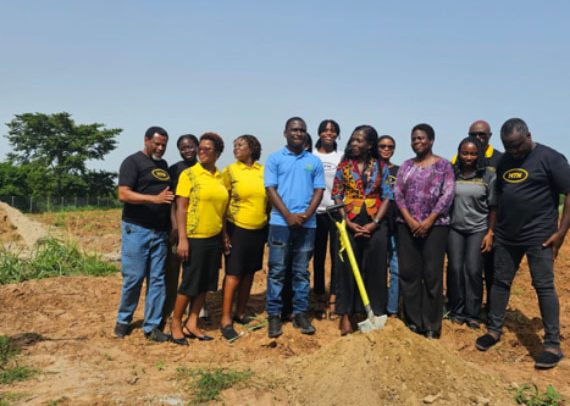MTN, UG staff at the sod-cutting ceremony
MTN Ghana, in collaboration with the University of Ghana’s Faculty of Agriculture, and smart agronomic support services provider, Defarmercist, has launched a GH¢3 million initiative to establish a Vegetable Centre of Excellence at the University of Ghana Farms at Legon.
This project aims to empower youth through modern vocational agriculture training, equipping them with practical skills to start their own agribusinesses.
The pilot phase of the project is set to train at least 300 young people over the next two years in modern agricultural practices. The centre will provide both theoretical and practical training in areas such as crop production, greenhouse farming, marketing, and agribusiness management. Graduates will benefit from access to land, farming tools, and market linkages to help them establish their own agribusinesses.
During the launch, MTN Ghana’s Chief Corporate Services and Sustainability Officer, Adwoa Wiafe, emphasized that the initiative is designed to equip the youth with practical skills to combat unemployment.
“We recognise the need to create jobs for the youth, and agriculture is one of the main support systems not just in Ghana but globally,” she stated.
Madam Adwoa Wiafe noted that the new centre aims to expand this vision by targeting a broader demographic and scaling up operations.
“This is not just about learning how to plant. It’s about making agriculture attractive, practical, and profitable. Whether you’re a student or someone from the wider community, this project is designed for you,” she explained.
Madam Adwoa Wiafe highlighted that increasing local vegetable production would contribute to reducing prices and lessening the country’s dependence on imports.
“This is a homegrown initiative. Everything—from training to production—is Ghanaian-led, aimed at creating real, lasting impact,” she stressed.
General Manager of Defarmercist, Charles Agyeman, outlined the programme’s structured two-phase model: the first phase will focus on greenhouse and open-field production, followed by commercial agribusiness training in the second phase. ]
He emphasised the centre’s practical approach, stating, “We are moving beyond theory. By integrating proven agricultural techniques from countries like Israel and the Netherlands, we are ensuring graduates can hit the ground running.”
Head of the Dean of Agriculture at the University of Ghana, Professor Eric Nartey, praised the initiative and urged MTN to further invest in smart classrooms to reach underserved communities.
“We want to train more young people, especially those from disadvantaged backgrounds, using our own local expertise,” he added. Overall, this project is expected to significantly enhance practical agricultural education, reduce import dependency, and create sustainable job opportunities for Ghanaian youth.


